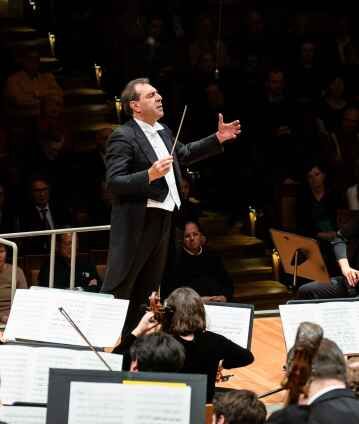Daniele Gatti conducts Schoenberg, Strauss and Wagner

Daniele Gatti conducts three late Romantic works. In Transfigured Night, Arnold Schoenberg depicts the conflicted emotional state of a pair of lovers, while Richard Strauss’s Death and Transfiguration reflects the emotions and visions of a dying man. Passion transformed into music – the opera Tristan und Isolde, in which Richard Wagner celebrates a love that finds its ultimate fulfillment in death. We hear the Prelude and Liebestod.
In this concert, the last item forms a kind of synthesis of the two preceding works: in Arnold Schoenberg’s early masterpiece, the “transfiguration” occurs through love, in Richard Strauss’s symphonic poem in death – and at the end of Richard Wagner’s Tristan und Isolde, both moments come together in the “Liebestod” of the titular heroine.
The concept of transfiguration comes from Christian tradition: the New Testament reports how the praying Jesus appears to be transformed in the presence of some disciples and his robe and face glow in “brilliant white”. The composers of this programme, however, were concerned with other kinds of transformation: Schoenberg’s tone poem Verklärte Nacht, originally written for string sextet, is based on a poem by Richard Dehmel, which tells of a lovers’ nocturnal walk full of conflict. Tod und Verklärung by Richard Strauss depicts, according to the composer, the pain and memories of a dying person. At the end, “the ideal that he has tried to represent artistically” appears to him, but will only be realised in the afterlife. In the 1890s, Strauss and Schoenberg, whose paths were later to diverge, still appeared to be kindred spirits: both works are characterised by great emotional tension and harmonies influenced by Wagner. And both turn – in the sense of a musical transfiguration – from minor to major at the end. Wagner, on the other hand, dissolves the famous Tristan chord into transcendent beauty at the end of his opera.
As an Italian conductor with a particular affinity for Wagner’s music, Daniele Gatti follows in the tradition of Arturo Toscanini and Claudio Abbado. Since his debut in 1997, he has conducted a number of works from the Romantic and Modern periods with the Berliner Philharmoniker.
© 2024 Berlin Phil Media GmbH
Related interview
Artists
Our recommendations
- Daniele Gatti conducts Stravinsky and Shostakovich
- Daniele Gatti conducts Brahms, Stravinsky and Webern
- Daniele Gatti conducts Hindemith and Brahms
- Daniele Gatti conducts masterworks of French modernism
- Daniele Gatti’s journey from the Romantic to the modern era
- Simon Rattle conducts Mozart’s “Magic Flute”